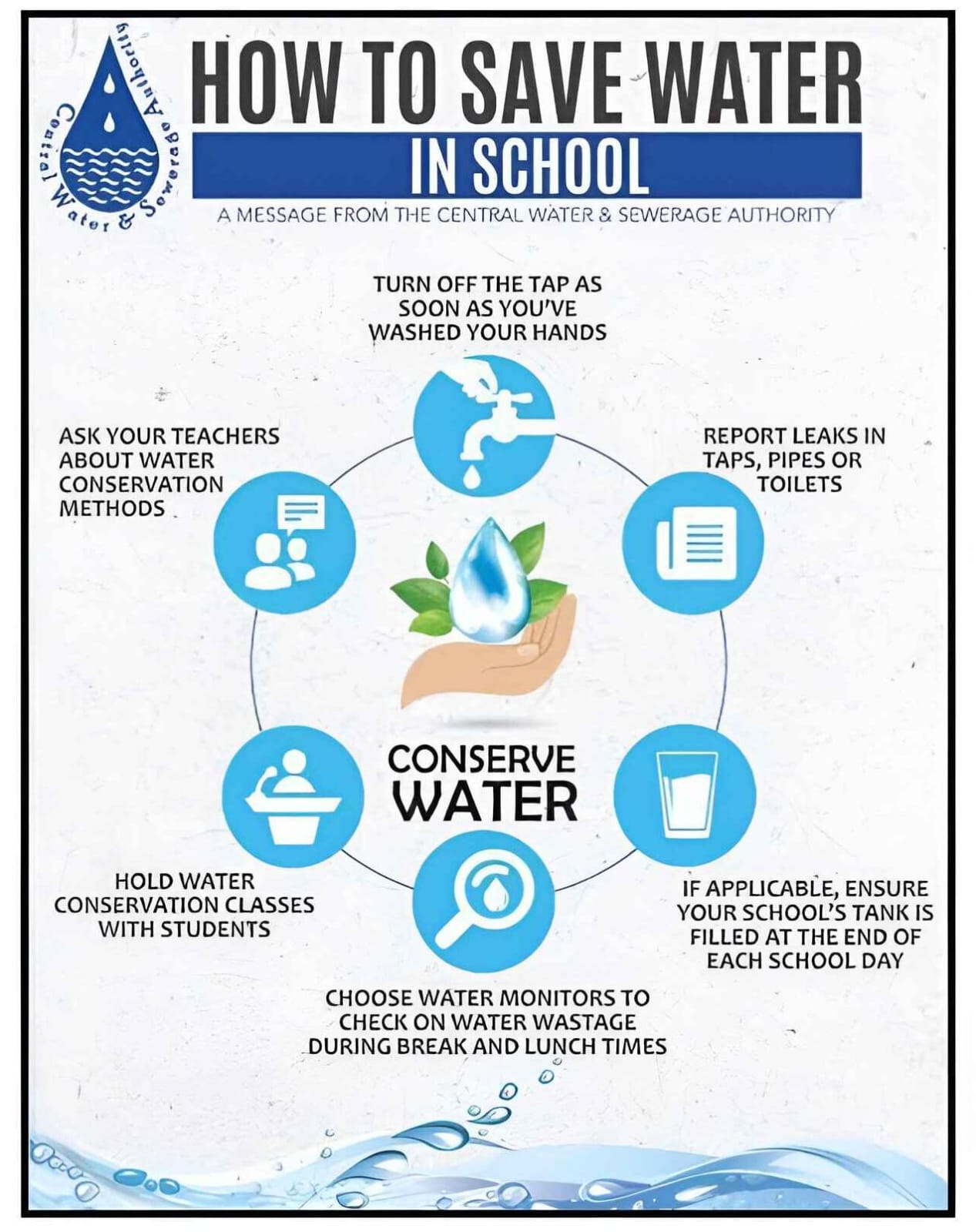Name of the activity:
To collect information about any of the following topics using the internet: -Ideal water use scheme for your school.
Purpose/Importance of the activity:
Promoting responsible water use to conserve resources and raise awareness.
Proposed time duration of the activity:
2 weeks for planning, implementation and assessment.
Materials and apparatus required for the activity:
Water meter, awareness posters pamphlets, buckets and watering cans.
Methodology of the activity:
i) Water usages assessment: Conduct a detailed analysis of the school's current water
usage including taps toilets and gardens.
ii) Student awareness program: organised workshops and presentations, to educate
students about the importance of water conservation and responsible water use.
iii) Implement water-saving measures: introduce practical initiative such as installing
water-efficient fixtures, using dual-flush toilets and fixing leaky taps.
iv) Rainwater harvesting system: explore the feasibility of setting up rainwater
harvesting systems to collect and reuse rainwater for non-potable purpose.
v) Water monitoring: install water metres to track water consumption and rays awareness
among students and staff.
vi) Student involvement: Encourage students to take ownership of the water-saving
initiative by performing a "Water conservation club" to promote responsible water habits.
vii) Water-saving campaigns: conduct campaigns with posters, pamphlets and interactive
activities to engage the school community in water conservation efforts.
viii) Collaboration with local authorities: partner with local government or environmental
organisations for guidance and support in implementing the water-saving measures.
ix) Regular evaluation: Monitor the impact of the water use scheme regularly and make
necessary adjustments to improve efficiency.
Diagrams/Photographs of the activity:

Concepts Learnt During the Activity :
Through the ideal water use scheme , I gained insights into water conservation ,
sustainable practices , and the importance of community engagement in preserving our
precious water resources.
What New Things Did You Learn ?
During the activity I discovered the significance of rainwater harvesting and the impact
of small water-saving measures in promoting a more eco friendly school environment.
Conclusion :
The implementation of the water use scheme not only fosters responsible water habits
among students but also contributes to a more sustainable and environmentally conscious
school in Virar, Maharashtra.
Your Own Opinion / Experience About the Activity :
Being part of this initiative was empowering, and it made me
realise that collective efforts, even in a school setting can make
a real difference in conserving water and protecting our
environment.
Cooperation from the parents:
Parents actively supported the water-saving effort by
encouraging water conscious behaviour at home and
participating in school events and campaigns.
Opinion of the parents:
Parents appreciated the schools commitment to water conservation and they
were proud to see their children actively involved in promoting responsible
water use at school and home.
Persons who have helped you:
My teachers, classmates, school staff and local NGOs played crucial roles in
the success of the water use scheme making it a collaborative efforts for a
sustainable future.
List of reference materials:
Wikipedia, official government websites, books.
which should be included in a water conservation program in our school.
i) Display informative posters and banners throughout the school to create awareness about responsible water usage and the need to avoid wasteful practices.
ii) Install water dispenser's equipped with controlled flow mechanism to reduce water wastage while refilling water bottles.
ii) Organised water-saving challenges and competitions to encourage students to develop innovative solutions for conserving water .
Diagrams/Photographs of the activity:
| Types of misuse/wastage of water by students | Total number of students misusing / wasting water | Corrective measures |
|---|---|---|
| 1. Keeping the tap running while drinking water. | 10 | Asking the concerned students to prepare information chart about importance of water. |
| 2. Wasting water while washing tiffin. | 25 | Create awareness posters. |
| 3. Wasting remaining water from the bottle. | 15 | Set up water use guidelines. |
| 4. Splashing water on others while playing. | 10 | Introduce water-saving campaigns. |
| 5. Washing hands, feet and face for no reason. | 5 | Appoint water conservation monitors. |